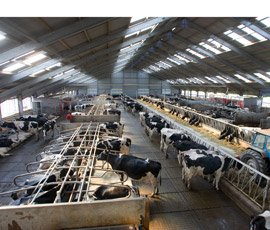Large-scale farming offers wildlife benefits

A larger-scale approach to sustainable farming could be more beneficial for wildlife than our current system of farm-based agri-environment payments, according to new research.
Researchers at the University of Leeds have been investigating the most effective approaches to optimising sustainable food production while protecting wildlife.
They concluded that conservation of populations of animals and plants requires thinking and planning across the landscape, because it is at this scale – not the farm scale – that many ecological processes happen.
Across the UK, different landscapes may also be better at producing food or producing ecosystem services, so one approach may be to concentrate more conservation efforts in particular areas, such as the uplands and coastal wetlands, which are particularly wildlife-friendly, while enabling areas that are best suited to food production to be farmed intensively.
A key advance in thinking is not how to make each farm more “wildlife friendly” in itself, but how to make the landscape as a whole better for producing both food and wildlife, said research leader Tim Benton of the University of Leeds.
“Thinking at a larger scale, to create sustainable landscapes is the key,” said Prof Benton.
“Reform of the Common Agricultural Policy provides an important opportunity to create sustainable landscapes, as it is championing ‘sparing land’ from food production on each farm to contribute to environmental aims.
“This ‘spared land’ could constitute a landscape-scale network if properly designed and managed.”
Prof Benton added: “But we also need to plan a strategy that works at national level and look at how intensive farming within sustainable landscapes in some localities could be balanced by prioritising wildlife to a greater degree in others.
“Only by much larger-scale thinking can we hope to achieve the holy grail of increased production that is sustainable and does not damage irreparably the natural processes that we all depend upon.”
The research, part of the Rural Economy and Land Use programme, has shown that a mixture of high-yield, intensive farming and land managed for nature can, in some instances, produce both more food and more wildlife than the pursuit of “wildlife-friendly” farming across the whole landscape.
As the optimal way to manage a landscape to produce farming and wildlife will vary from place to place, a common policy framework may be needed setting overall aims and processes for making decisions, with implementation devolved to county or regional level, the research concluded.
Philip Case on G+Issues with large-scale farming need addressing
